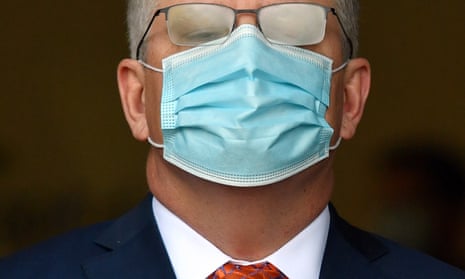How good is Australia?
It depends on the measure.
Julian Hill decided to try to answer Scott Morrison’s favourite rhetorical question by measuring Australia’s success on a range of measures – economic growth, employment, healthcare and education – against the rest of the world.
Drawing upon research from the parliamentary library, as well as reports from the Organisation for Economic Cooperation and Development and international data, the Labor MP said he had found Australia became “less productive, more unequal, more corrupt, less happy, more indebted, less affluent and less trusting of public institutions” than it was when the Coalition was elected in 2013.
His report, released on Monday, assesses the last seven years of Coalition government in Australia against global rankings. It will form part of Labor’s next stage of campaigning – a compare-and-contrast exercise aimed at making voters think of life outside the pandemic response.
Hill said the data wasn’t new – he has just pulled it together to make a point.
“There is this propaganda-style myth that the Liberals are great economic managers – but the facts do not support this claim,” Hill said.
“On just about every key measure, after more than seven years of this government, Australia has gone backwards economically, and in fact did far better under Labor.”
Hill, a backbencher who has been deployed in the past to run attack lines against the government, said data wasn’t partisan.
Among the metrics is wage growth, which the reserve bank governor, Dr Philip Lowe, has identified as a focus of the central bank this year as it attempts to help steer the economy while vaccines pave the way for the world to begin emerging from the pandemic.
The OECD data shows real wages in Australia were 0.7% lower in 2019 compared with 2013, with Australia sitting 33rd out of 35 countries in terms of wage growth – only the Netherlands and Spain rank worse – and well behind comparable economies, including Germany and South Korea.
In 2013 Australia ranked 10th among OECD nations for productivity. In 2018 it dropped to fifth last.
Housing has also become more unaffordable, with Australia now the third most unaffordable housing market, after New Zealand and Canada. According to the Grattan Institute data used in Hill’s report, average full-time earnings and home prices split in the mid-90s, putting home ownership out of reach for many.
Hill said the data also showed inequality had increased, with the 10% of highest income earners in Australia owning 46% of all household wealth. The lowest earning made up 60% of the population but can claim just 16% of Australia’s household wealth.
“Even before the Covid recession, the highest 20% of households, with average after tax incomes of $4,166 per week, had almost six times the income of the lowest 20% with $753 per week,” the report said.
“When it comes to wealth inequality it is even more stark – the highest 20% with average wealth of $3.3m, have 90 times the wealth of the lowest 20%, with just $36,000 on average.”
Australia has slipped in global rankings on climate performance and emissions reductions, while the Australian Electoral Survey showed satisfaction with democracy dropping from 72% in 2010 to 59% in 2019.
Hill said the point of the data was to remind people that Australia “was behind economically before this crisis” and was slipping behind in rankings.
The government has pointed to Australia’s economic rebound from the pandemic occurring “earlier and stronger” than predicted, forming the basis of “Our Comeback” campaign – whose terminology was adopted after market research – as proof of the success of its policies.
“I think most Australians [know] that the economic comeback in this country is under way,” the prime minister said last week.
“It began last year. Some 90% of the jobs that were lost over the course of the terrible Covid-19 recession and pandemic have come back into the economy.”
The treasurer, Josh Frydenberg, said the Australian economy’s rebound left “Australia better positioned than nearly any other country in the world, with the IMF forecasting that the economic impact of Covid-19 will be much more severe in the United States, across Europe – whether it’s the UK, France, Germany, Italy or Spain – in Canada, in Japan and in nearly every other country around the world.”
Hill said people need to look at the data, and what was happening around them, instead of just taking the government’s word for it.
“The total picture is damning for the government,” he said of the collated research.
“We’ve had three prime ministers, three treasurers and 20-something energy policies under this government, and Morrison’s spin should not be allowed to cover up the fact that Australia has actually gone backwards under the Liberals, and is falling behind the rest of the world.”
